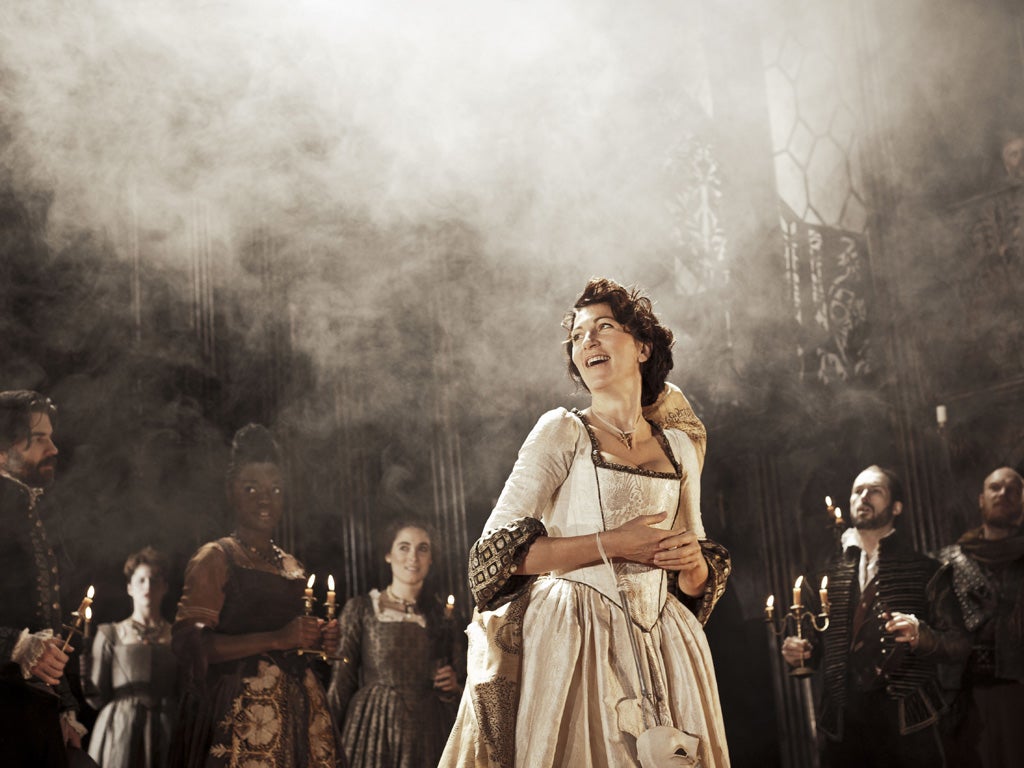The Duchess of Malfi, The Old Vic, London The King's Speech, Wyndham's, London Uncle Vanya, Print Room, London
Everybody apart from Eve Best disappoints in a new production of Webster's tragedy. Those who like a happy ending may prefer 'The King's Speech' – on DVD

She is determined to wed the man she loves. In John Webster's grisly Jacobean tragedy The Duchess of Malfi – staged by Jamie Lloyd – Eve Best plays the titular heroine as a naturally sensual woman and spirited feminist ahead of her time. Defying her marriage-forbidding brothers, she woos her lowly steward, Antonio.
While publicly denouncing lewdness, her ducal twin Ferdinand (Harry Lloyd) is an incestuously possessive psychopath. Her other sibling (Finbar Lynch) is a cardinal, lecher and lethal Machiavellian.
Webster took a damningly grim view of court life, and has even small mercies come with a sting in their tail. The venal henchman, Bosola (Mark Bonnar), repents the atrocities he has executed only to commit another revenge killing – a disastrous case of mistaken identity.
Soutra Gilmour's set design is stunning: a soaring, candlelit palace of tracery and pillars, criss-crossed with balconies like a Piranesian prison. Best's first entrance is dazzling. Silhouetted in a silver haze, she dances slowly down a tunnel of light as if at some ghostly masked ball. Her entire performance is outstanding, progressing along an arc of emotions from humorous tenderness to raging despair to valiant dignity in the face of a violent death.
Jamie Lloyd has, however, failed to extract top-notch acting from other cast members, some of them woefully bad. Sporting a villainous quantity of eyeliner, Harry Lloyd's Ferdinand is criminally unconvincing. Supposedly guilt-maddened and poring over the Duchess's veiled corpse, he intones "Let me see her face again" with all the ardour of a bloke requesting a ticket to Willesden Junction.
Webster's electrifying imagery is often wasted; the plot rambles, and there's a voyeuristic creepiness about the scenes of abusive sex and death.
In stark contrast, a happy ending comes courtesy of The King's Speech, directed by Adrian Noble. We all know that Prince Albert, Duke of York – aka Bertie (played by Charles Edwards) – will triumph over adversity as the stammering second son of George V.
Writer David Seidler's stage version, which pre-dates his 2010 screenplay, is structurally slacker, but essentially follows the same storyline. Edward VIII fecklessly abdicates to marry Wallis Simpson. So his brother, thrust into the limelight as George VI, battles with his stutter to make the crucial 1939 broadcast, rallying the British empire to fight Hitler.
The portrait of the personal agonies endured, in the name of duty and public service, by Elizabeth II's father is touching and inspiring, with some background facts that aren't in the film (though Bertie's initial siding with the appeasement camp is still played down). The King's Speech is fascinating regarding the possible causes of Bertie's stammer (repressive pater, sadistic nanny, etc) and the techniques the speech therapist may have used as his talking cure.
Fundamentally, this is theatreland's celebratory hurrah, coinciding with the royal jubilee. Perish the thought that any ignoble commercial opportunism could be at work. In fact, it makes an interesting pairing with the West End's current revival of The Madness of George III, Alan Bennett's royal drama about a doctor curing a monarch by making him get off his high horse.
The main problem is that Noble's production risks looking like a poor cousin of the award-winning film. The set is neat but spartan: a giant ebony picture frame with translucent scrim. Jonathan Hyde is excellent as Logue, maybe even better than Geoffrey Rush, nicely understated, never sentimental. But Emma Fielding, as Bertie's snooty but supportive wife, is barely distinguishable from Helena Bonham Carter. Edwards is very likeable, yet does not convey nearly as much bottled-up desperation as Colin Firth. So, watch the DVD.
Finally, Lucy Bailey's new off-West End production of Chekhov's Uncle Vanya gets off to a wonderful start, intimately staged in the round under the slanting sun of a hot summer afternoon. With terrific rumpled naturalism, Iain Glen's Vanya lounges around in a battered straw hat. Letting the hard graft of managing this provincial estate go hang, he snipes wittily about the freeloading houseguest who infuriates him – David Yelland's splendidly pompous Professor.
Meanwhile, the doctor, William Houston's Astrov, is knocking back vodkas, seemingly blind to the unspoken adoration of Vanya's dowdy niece, Charlotte Emmerson's Sonya. Both men are mesmerised by the Professor's alluring wife, Yelena (Lucinda Millward). Chekhov's group portrait of ennui, desire and despair is timelessly poignant. Mike Poulton's superb new translation is very funny too. This production is unfortunately marred by Millward's oddly wooden performance which, far from generating sexual chemistry, nearly kills the play stone dead.
'The Duchess of Malfi': (0844 871 7628) to 9 Jun. 'The King's Speech': (0844 482 5120) booking to 21 Jul. 'Uncle Vanya': (0844 477 1000) to 28 Apr.
Theatre Choice
Michael Ball is startlingly transformed into a ghoulish psychopath for Stephen Sondheim's Sweeney Todd, with Imelda Staunton as his spry comic partner in crime, at the Adelphi, London (to 22 Sep). Moon on a Rainbow Shawl, Errol John's tragicomedy about a community in 1940s Trinidad, is beautifully acted at London's NT Cottesloe (to 9 Jun).
Subscribe to Independent Premium to bookmark this article
Want to bookmark your favourite articles and stories to read or reference later? Start your Independent Premium subscription today.

Join our commenting forum
Join thought-provoking conversations, follow other Independent readers and see their replies